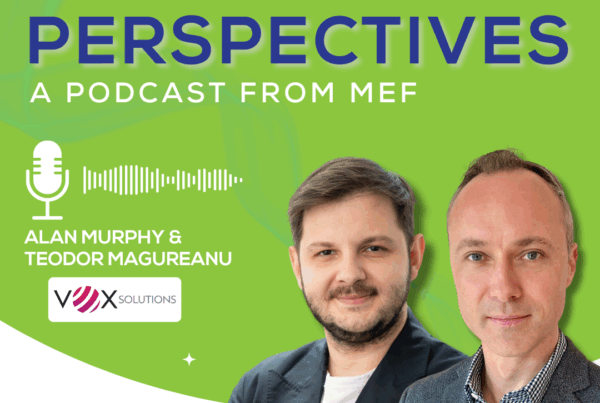Nobody disputes the TV, PC, Internet and mobile changed consumer lives. Every year, analysts share their predictions for the “next 10 big things” set to disrupt our world – from AI and AR to driverless cars to blockchain. But what can now really achieve mass-adoption and change consumer lives?
In 2016 much attention has been given to the Personal Data Economy. Everyone from Governments and regulators to enterprises and developers see the potential and the benefits.
A key driver for this is new data regulation (GDPR) and just last week Giovanni Buttarelli, the European Data Protection Supervisor added his weight to the discussion stating:

“Our online lives currently operate in a provider centric system, where privacy policies tend to serve the interests of the provider or of a third party, rather than the individual. Using the data they collect, advertising networks, social network providers and other corporate actors are able to build increasingly complete individual profiles. This makes it difficult for individuals to exercise their rights or manage their personal data online. A more human-centric approach is needed which empowers individuals to control how their personal data is collected and shared.”
Here we’ve collected the thoughts of some of the MEF members and other companies that are active in the debate.
Benjamin Andre, Co-Founder & CEO, Cozy Cloud
The industry is facing the Personal Data Economy like a five-year old child is facing a first bike. You know the ride will bring you real value, but you are afraid of falling. Privacy policies like GDPR act like training wheels, helping the industry ride the Personal Data Economy faster.
This economy can only work if consumers have their own digital home. A trusted place, because it is theirs, where they can gather all their data and benefit from unparalleled personalization.
For companies, it is a revolution in their business models: no need to retrieve data in their data-centres, all their digital services being offered at their customers’ digital homes. This is where trust is highest and digital intimacy the greatest. And to get there as a company, you need to start riding your bike now!
Nathan Kinch, Head of Experience & Labs, Meeco
Personal data controlled by individuals will revolutionise the creation of new value in the same way just-in-time transformed manufacturing. The personal data economy is, and should be, person-centric. We ought to look at data as an asset; something that can be used to enhance our experiences with industry as well as education, commerce, health and finance.
To put it in context, just as businesses have collaborated to create value by exchanging data in standardised formats via APIs, in the new person-centric data economy, we too as human beings will have the ability, through the API-of-Me, to exchange data in a standardised format, on our terms, with people and organisations we trust to create shared value.
This will amplify existing value chains, and create new ones, rather than simply disrupting those that already exist.
Stefan Keiss, Founder at Tapcore
The shift to the Personal Data Economy is driven by key players of the market. They must give up typical approach of “data selling”, it’s out of date. The problem of customers’ trust is primary an opportunity to change the business model and the only possible way to do this is to act together.
The market is not interested in data itself, it demands universal business intelligence to cover their needs. The winners will be those, who sell not just the data, but action triggers.
Stakeholders need to invest in market positioning and growing customer trust. To achieve this firstly, an unified transparent list of requirements to the process of data collection is needed, the way ad tech communicates with end-users also should be standardized.
Customer’s trust will improve by introducing transparent End User Licence Agreements and the option to opt-out effortlessly. Finally, companies should give up explaining to media what data they do collect while focusing on making this process easy to understand for everyone.
Laurent Charreyron, Identity and Privacy expert at KuppingerCole
The GDPR is an essential first step to structure the regulatory landscape. Insurance, Energy and Healthcare are where things are happening right now. But eventually all domains will be touched.
Shifting from a vendor-centric to a customer-centric organisation is a key strategic decision which affects most part of the organisation and should be actively endorsed at board level.
The most compelling incentive will come from competitive disruption. Telcos know well what it costs to do nothing! One core issue certainly is the valorization of such services. Why change something if your churn rate is not impacted?
At the same time the industry should do the following : adopt open technical standards, engage in cross-discipline research pilots (with sociologists, psychologists, economists, ergonomists, computer scientists); start a discussion with consumer organizations, etc.
Gilbert Hill, Director, Business Development at OneTrust
We are not quite at the nirvana of one to one marketing but we are getting closer every day; so businesses have to treat customer data as they do their customers – with care and respect. Customers vote with their feet, so business has to earn loyalty by constantly demonstrating care of how it captures, stores and uses their data.
GDPR makes a customer- centric approach to data mandatory. Companies who ignore this face a ‘double whammy’; fines of up to 4 per cent global turnover from GDPR, or worse still, permanently losing customers and reputation. UK data breach episodes like Talk Talk mean that high profile casualties should serve as a warning for businesses to get their house in order.
If you would like to contribute a comment to this article contact us at editorial@mefmobile.org or leave your thoughts in the replies below.
The European Consumer Trust Summit – London, December 1st
Part of MEF London Week and supported by Mozilla, the 7th Consumer Trust Summit brings together enterprises, start-ups and technology providers to discuss key market enablers and offers an essential European regulatory update.
Join MEF Members and guest speakers for this half-day programme featuring four expert sessions taking an in-depth look at the regulation, use cases, trends and drivers that are disrupting and enabling game-changing opportunities for businesses and consumers alike when it comes to personal data. Sessions include focus on GDPR, Privacy ‘2.0’, Digital Identity and the Personal Data Economy.










